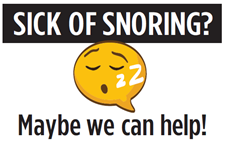Bed-partner disturbance. This is arguably the most important social and health issue of snoring. We have even heard of the family pet leaving the room and going downstairs. But about half those who snore have some degree of sleep apnoea.
Some snore in their nose and above the soft palate. Where these constrictions happen, or are suspected, you can use Cottle’s Test. Taking your finger-tips gently make the nostrils a little wider. 1 or 2mm will usually do. Just inside the nostrils there are cartilage ‘flaps’ or valves and if the nose is too narrow these don’t open. Here nose-cones are helpful.
Sometimes the issue is a little higher where the cartilage of the nose tip and the bones of the nose meet. Again a nose cone may well work and give good night-time breathing.
Similarly nasal sprays can reduce swelling in the nose and is s simple and low cost method. Choose a spray that has XYLITOL in it. This is wood sugar and the bacteria, prevalent in the mouth where they some of the ones that cause tooth decay, get into the nose and cause inflammation and swelling. Regular use can reverse this.
This reversible approach is far better than surgery as your first option. (see Empty-nose)
Sleep Apnoea: While there are PSG and similar tests there are simple indicators. One simple question is do you wake and go to the toilet at night? Another is the state of your bed on waking. Restless leg syndrome is the brain’s response to being alarmed when the breathing is altered and oxygen levels drop. Restless leg (or limb) is a parafunction which is ‘alongside the normal’. One that is often ignored is parafunction of the jaws. That is night-time grinding of the teeth. Many snorers complain of sore muscles in the jaws and face when they wake. These muscles that operate the jaws become over-worked and painful.
Sleep Apnoea can be, but not always, a serious and potentially fatal disorder and should be properly evaluated. You can check the prospects of having this yourself. Look up S.T.O.P.B.A.N.G. tests. Also Dr. David White from Harvard’s sleep quiz and from Melbourne the Epworth Sleepiness scores. These are available under sleep-scoring. They are an indicator and not a diagnosis, this must be done by a sleep doctor. Mild apnoea may not even need treatment, but this can’t be guessed and takes real skill and often a formal sleep test to assess. If you have apnoea first talk this over with your doctor and maybe then seek help from a sleep doctor.
If you don’t get clear and simple explanations or told it’s not too bad, don’t be surprised as sleep apnoea is poorly recognised. Prof James Mold checked the records of the doctors at 44 different USA practises in 5 major locations and noted that given the medical records of patients his team estimated 90% of patients seen had a sleep-related health issue and few were ever discussed.
If this is the truth, then use online screening to figure it out and then when you can get to see a sleep doctor. Don’t simply put it off. It’s not the doctors fault – this field is still young and even the teachers are still learning.
Medications: All medications have multiple effects. A medication given to help you sleep often relaxes your throat more and makes the problems worse. Discuss this with your doctor and perhaps change medications. Some, particularly those used in depression [SSRI] drugs make people grind heavily, some damaging teeth and the jaw joint. These can also be modified or exchanged where prudent.

